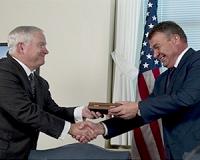| . |  |
. |
Moscow (UPI) Sep 15, 2010 Mystery surrounds the death of Maj. Gen. Yuri Ivanov, deputy chief of Russian Military Intelligence, whose decomposing body was found on a Turkish beach in August after he disappeared in neighboring Syria. On Aug. 28, 12 days after Ivanov's body was found by Turkish fishermen in Hatay province, the Russian army newspaper Red Star reported the general had died in a "swimming accident" near the Syrian port of Tartous. But there was widespread speculation that the 52-year-old general had been killed, the latest in a series of political assassinations in the Middle East in recent years. Russia's Defense Ministry refused to comment further. As far as is known, Ivanov was quietly buried in Moscow. But even the Russian media questioned the official version of Ivanov's death, noting that as a top-ranking intelligence officer he would have been under the constant protection of bodyguards. The news outlet Svobodnaya Pressa noted: "Spies of that rank are well-protected. As a rule, they don't die by chance." Ivanov was last seen Aug. 2 visiting the site where a Russian naval base is being built at Tartous for the Black Sea Fleet. It will be the Russians' only foothold in the Mediterranean. The Turkish newspaper Vatan reported Sept. 1 that Ivanov vanished after he left the base for a meeting with Syrian intelligence officers. It isn't clear whether he was accompanied by aides or bodyguards but it would be highly unusual if he wasn't. The Israelis are concerned that Moscow will use the facility, scheduled for completion in 2013, as a base for spy ships and establish an electronic surveillance installation in Tartous that could spy on their communications and military movements. The Russians are constructing the base, which could accommodate large warships, at a time of high tension between Israel on the one hand and Syria, Lebanon and Iran on the other. The Israelis have warned Damascus that it risks being hit if it continues to provide missiles and other weapons to Hezbollah in defiance of a U.N. Security Council resolution that ended a 34-day war between Israel and Hezbollah in 2006. There was speculation that Israel's foreign intelligence service, the Mossad, may have been behind Ivanov's mysterious demise. It has a record of eliminating the enemies of the Jewish state. But that seems unlikely. In the murky world of intelligence, spy agencies rarely kill senior figures from rival services. Besides, Israel signed a landmark military cooperation agreement with Russian in Moscow Sept. 6. That has far-reaching ramifications in the Middle East since Moscow traditionally has supported Arab states and built a nuclear reactor for Iran that was recently inaugurated. But Moscow is also engaged fighting Islamist separatists in the Caucasus, just as Israel is fighting them in the Middle East. One of the highlights of the new military pact is a $100 million deal for Israel to provide Moscow with high-tech unmanned aerial vehicles to tighten surveillance over Georgia, with which Russia fought a brief war in 2008. It is unlikely in the extreme that Israel would sanction the killing of a top Russian intelligence chief a month before such an important agreement was signed or that the Syrians did it since they depend on Moscow for advanced weapons systems. It is conceivable that Ivanov's death was linked to his work with the Russian Military Intelligence, known by the initials GRU, which reports to the general staff of Russia's armed forces and these days is bigger than its longtime rival, the KGB, which was broken up after the fall of communism. In 2000-06, Ivanov led the campaign against Chechen separatists. He allegedly masterminded the assassination of several leaders. One, Zelimkhan Yandarbiyev, was blown up by two GRU agents in Qatar in 2004. The assassins were arrested, sentenced to lengthy prison terms and sent to Russia to serve their sentences. Both promptly disappeared. Ivanov's death recalls the mysterious Aug. 2, 2008, assassination in Tartous of Brig. Gen. Mohammed Suleiman, a close confidant of Syrian President Bashar al-Assad and Damascus' main liaison with Hezbollah. He was shot by a sniper, apparently firing from a boat offshore, as he sunbathed at a well-guarded resort used by Syria's elite. Some reports have identified the shooter as a captain in the Israeli navy's elite commando unit Flotilla 13.
Share This Article With Planet Earth
Related Links Learn about the Superpowers of the 21st Century at SpaceWar.com Learn about nuclear weapons doctrine and defense at SpaceWar.com
 US, Russian defense chiefs promote deeper ties
US, Russian defense chiefs promote deeper tiesWashington (AFP) Sept 14, 2010 US Defense Secretary Robert Gates and his Russian counterpart Anatoly Serdyukov vowed to expand military cooperation on Wednesday, in a sign of improving relations between Moscow and Washington. In the first visit to the Pentagon by a Russian defense minister in five years, Serdyukov was greeted with military pomp before heading into a full day of talks with Gates. The high-profile visit ... read more |
|
| The content herein, unless otherwise known to be public domain, are Copyright 1995-2010 - SpaceDaily. AFP and UPI Wire Stories are copyright Agence France-Presse and United Press International. ESA Portal Reports are copyright European Space Agency. All NASA sourced material is public domain. Additional copyrights may apply in whole or part to other bona fide parties. Advertising does not imply endorsement,agreement or approval of any opinions, statements or information provided by SpaceDaily on any Web page published or hosted by SpaceDaily. Privacy Statement |